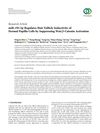3 citations,
February 2020 in “The Egyptian Rheumatologist” Recognizing LET and AITD can help diagnose SLE early for better treatment.
23 citations,
October 2020 in “Anais brasileiros de dermatologia/Anais Brasileiros de Dermatologia” Tailored treatments for alopecia areata are recommended based on severity and patient needs.
 51 citations,
June 2021 in “Signal Transduction and Targeted Therapy”
51 citations,
June 2021 in “Signal Transduction and Targeted Therapy” The document concludes that while there are promising methods to control CRISPR/Cas9 gene editing, more research is needed to overcome challenges related to safety and effectiveness for clinical use.
 July 2016 in “American Journal of Dermatopathology”
July 2016 in “American Journal of Dermatopathology” The meeting showcased rare skin disease cases, highlighting the need for accurate diagnosis and treatment.
 March 2014 in “Journal of The American Academy of Dermatology”
March 2014 in “Journal of The American Academy of Dermatology”  June 2023 in “Pharmaceuticals”
June 2023 in “Pharmaceuticals” Men and women respond differently to drugs for COVID-19, high cholesterol, and diabetes, which suggests a need for personalized treatments.
 97 citations,
January 2014 in “Journal of The American Academy of Dermatology”
97 citations,
January 2014 in “Journal of The American Academy of Dermatology” Dutasteride 0.5 mg works better than finasteride and placebo for increasing hair in men with hair loss.
 June 2001 in “Annals of Internal Medicine”
June 2001 in “Annals of Internal Medicine” The conclusion suggests that the zinc lozenge study is valid despite imperfect blinding, as many participants could not correctly identify their lozenge type.
 December 2024 in “Cureus”
December 2024 in “Cureus” Baricitinib treatment for alopecia universalis can cause hair regrowth with unexpected whitening.
 177 citations,
December 2002 in “The Lancet”
177 citations,
December 2002 in “The Lancet” Fibrinogen/LDL apheresis may improve speech perception in sudden hearing loss, especially for those with high fibrinogen and LDL levels.
119 citations,
June 2021 in “Heliyon” Licorice has many health benefits but should be used carefully due to possible side effects.
 99 citations,
December 2010 in “Journal of The European Academy of Dermatology and Venereology”
99 citations,
December 2010 in “Journal of The European Academy of Dermatology and Venereology” The document concludes that certain genetic mutations and dietary factors are involved in acne development, and treatments like isotretinoin and diet changes can help manage it.
 June 2008 in “British Journal of Dermatology”
June 2008 in “British Journal of Dermatology” Herpes gestationis is linked to certain antigens, atopic eczema affects T cell populations and may be eased by breastfeeding, higher doses of anti-androgen treatment can improve androgenic alopecia, topical minoxidil increases hair thickness, long-term methotrexate therapy can cause liver fibrosis in psoriasis patients, and Lichen Sclerosus et Atrophicus patients aren't at higher risk for autoimmune disorders.
 January 2008 in “Springer eBooks”
January 2008 in “Springer eBooks” Thyroid disease can cause hair loss and treating thyroid problems might help with hair disorders.
 8 citations,
January 2012 in “Dermatology”
8 citations,
January 2012 in “Dermatology” The HPV vaccine may be linked to temporary hair loss in children, but the benefits outweigh the risks.
 5 citations,
January 2020 in “Current Pharmaceutical Design”
5 citations,
January 2020 in “Current Pharmaceutical Design” Geranium plants have healing properties like fighting microbes, protecting the liver, reducing inflammation, and may help with viruses, stomach issues, and diabetes.
 10 citations,
October 2018 in “Plant Biotechnology”
10 citations,
October 2018 in “Plant Biotechnology” Researchers found two enzymes in Avicennia marina that help produce maslinic acid and corosolic acid, which have medicinal benefits.
 2 citations,
October 2010 in “Reviews in Medical Microbiology”
2 citations,
October 2010 in “Reviews in Medical Microbiology” Syphilis is becoming more common and remains a major health problem due to challenges in prevention and treatment.
 5 citations,
June 2001 in “Annals of Internal Medicine”
5 citations,
June 2001 in “Annals of Internal Medicine” Rituximab effectively treated a woman's bone lymphoma that was resistant to other treatments.
 1 citations,
June 2001 in “Annals of Internal Medicine”
1 citations,
June 2001 in “Annals of Internal Medicine” The conclusion is that maintaining blinding in clinical trials is crucial for reliable results.
 February 2024 in “Oriental Journal of Chemistry/Oriental journal of chemistry”
February 2024 in “Oriental Journal of Chemistry/Oriental journal of chemistry” Eclipta alba shows promise for treating various health issues and needs more research.
227 citations,
April 2020 in “Cell” More precise, personalized therapies are needed for autoimmune diseases.
 86 citations,
May 2005 in “Seminars in Arthritis and Rheumatism”
86 citations,
May 2005 in “Seminars in Arthritis and Rheumatism” Kawasaki Disease is rare and often missed in adults, who show different symptoms than children, and may benefit from early treatment.
2 citations,
November 2004 in “Hospital pharmacy” Certain medications can cause serious side effects, so it's important to report them.
37 citations,
October 2014 in “JAMA dermatology” A woman with severe hair loss was successfully treated with the drug adalimumab.
 6 citations,
October 2016 in “Journal of Chemotherapy”
6 citations,
October 2016 in “Journal of Chemotherapy” A man lost all his hair as a rare side effect after hepatitis C treatment.
 19 citations,
January 2018 in “BioMed Research International”
19 citations,
January 2018 in “BioMed Research International” miR-195-5p reduces hair growth ability in cells by blocking a specific growth signal.
 January 2025 in “Frontiers in Pediatrics”
January 2025 in “Frontiers in Pediatrics” Baricitinib significantly improved hair regrowth and skin condition in a 14-year-old with alopecia areata and atopic dermatitis.
 2 citations,
September 2022 in “Dermatologic Therapy”
2 citations,
September 2022 in “Dermatologic Therapy” Tofacitinib is a promising treatment for severe alopecia areata, with many patients experiencing complete or partial hair regrowth.
 8 citations,
February 1997 in “International journal of environmental analytical chemistry”
8 citations,
February 1997 in “International journal of environmental analytical chemistry” Most medicinal plants in Mexican folklore have safe element levels, but arsenic exceeds safe limits in almost all.























